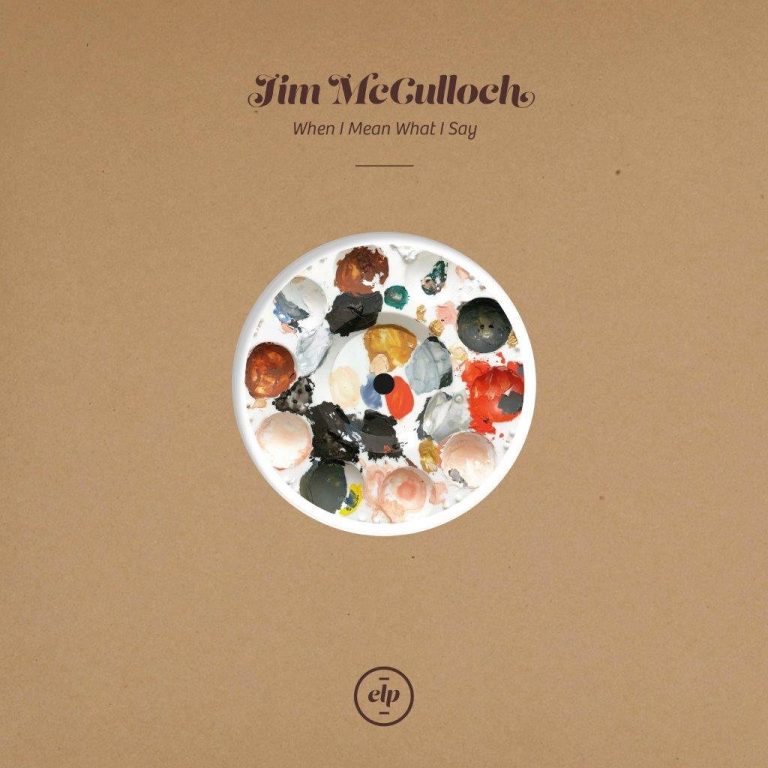Jim McColluch may not be a name you immediately recognise, but, if you’ve listened to any music from Scotland over the past 30 years or so, then you’ve probably heard him without knowing. From the BMX Bandits to the Soup Dragons, McCulloch has been around and working hard for many years. Not only a member of the aforementioned bands, he’s also ventured out under other monikers (Green Peppers, Snowgoose) and has collaborated with the likes of Isobel Campbell and Mark Lanegan. He’s respected by his peers too, with the likes of Norman Blake of Teenage Fanclub and Stuart Murdoch of Belle and Sebastian offering praise for his talent and influence over the years.
What’s a little surprising then after such a long and fruitful career, is that it’s taken until now for McCulloch to release a bonafide solo album under his own name. When I Mean What I Say fills that gap in his already extensive CV, and does so heartily with rich and delightful arrangements that feel both homely and friendly. McCulloch’s debut album rings out with a humble feeling of friendship and togetherness, with a message of appreciating the present moment and the surrounding world threaded throughout its economical half-hour runtime. The timbre and resonance of every note feels both warmed and entirely natural, like the songs were borne both from the moment he entered the studio and also from wistful melodies that have been swimming in his head for decades.
It’s no surprise that McCulloch knows his way around a concise and effective arrangement, and When I Mean‘s best moments comes from his flaunting this talent. “Chorus of Lists” uncurls itself like one big, long sentence (“If I haven’t got the nerve / Then I haven’t got the time / If I haven’t got the reason / Then I haven’t got the rhyme / If I haven’t got the rhyme / Then I haven’t got a clue”), and when the drums enter to hurry the words along, each line adds to the tension. The shimmering centrepiece and album highlight “Shining Bright” offers a delightfully (and appropriately) bright series of hooks with every turn, accentuated by Rachel Jack’s breezy guest vocals. The song’s constitution is so weightless that each of the hooks – from the florid verse melody, to the “do do do” chorus, to the sublime and affable guitar solo – leaves a strong impression on top, wiggling its way into your head for days ahead.
Alongside these more flush moments are songs that have McCulloch playing with little more than his guitar in hand. There’s a solemn loneliness that lingers in tracks like the quietly doleful “Downbeat” or the peaceful but sparkly “Come Little Waves of Light”, but the production of the album manages to find light and air in every moment. Helping lift McCulloch’s voice (which shows its age and limitations at a few points), it’s this warmheartedness that is almost the important player here; it helps a bum acoustic guitar string ring out poignantly or a bass note melt into the surroundings like it’s a naturally occurring sound.
This dusky, late summer evening wash helps the bright spots of the album radiate all the more strongly, but consequently some songs – particularly those on the b-side of the album – lay a little flat in comparison. “I Hope I Can Read The Forecast” is amiable enough in passing, but doesn’t linger in the mind. “Open & Shut” feels like it should make a grander impression with it’s jangling chords and “la la la”s, but again, even after repeated listens, it becomes a benignly pleasing filler track. There’s not a bad song on When I Mean, but there are a few middling to mediocre numbers that seem to serve as vessels to get between the album’s stronger moments.
Matching the flowering and twinkling arrangement on album opener “Blackstick Boogie”, the titular closing track returns with a full ensemble to see McCulloch out. Flush with melodica and weaved together vocal lines, “When I Mean What I Say” sees itself off into the distance with beautiful ripples of harp. “Don’t stop, don’t forget to breathe,” he incants, half like it’s a jovial nod to the continuous repetition of the line he brought upon himself, and half another instance of McCulloch imploring the listener to appreciate the moment they’re in. Like he insists earlier on “Chorus of Lists”, “Just look what’s in front of you.” It’s sound advice from a veteran of the scene.

